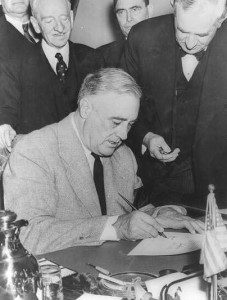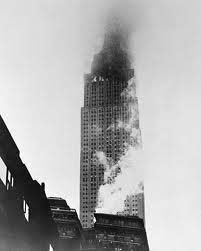
There was a day in my parents’ lives that changed everything. It happened in 1941. My father was 19 that September. My mother was a year younger. They both had grown up and gone to school in New York City. But events that day just before Christmas, meant that my mother would see her brother-in-law and her future husband, my father, go off to war. My parents were both U.S.-born and their American president described the change that day indelibly.
“December 7, 1941, is a date which will live in infamy,” Franklin D. Roosevelt said.
I know Pearl Harbor is a well-worn analogy, but my parents lived it. The experiences of their next four years – from 1941 until the Second World War ended in 1945 – definitely influenced the people they became. If the Depression hadn’t made them frugal, wartime posters and politicians told them to knit socks, save tinfoil, do volunteer work, reuse everything and buy war bonds certainly did. My parents also became more fatalistic. Some of my parents’ friends got married right away and even had children. They felt compelled to live life as if there were no tomorrow, just in case there wasn’t.
So it might be said about the events of Sept. 11, 2001. In the 10 years since, lots of our habits have changed. Some of us react to low-flying aircraft. Others don’t like staying very long in tall buildings. Rightly or wrongly we tend to look more suspiciously at strangers in our midst. Around airports – partly because we’re told to – we notice unattended suitcases.
And unlike before 9-11, now we’re used to packing our passports when travelling to the U.S. and not packing liquids, gels and aerosols of more than three ounces. Some politicians and media pundits refer to this as the “new normal.” I call it prompted paranoia – a culture of fear.
Sometimes our fears were perfectly natural and understandable. When Canadian troops (we knew) began shipping out to serve in the war against terror, those whose sons and daughters served in operations in Afghanistan stayed top of mind. In April 2002, the day that news broke about the friendly fire incident, the anxiety in Uxbridge was palpable until we learned those native sons and daughters were safe.
Still, when some of the 157 war dead were paraded along Hwy. 401 from Trenton to the Toronto coroner’s office, many of us made silent pilgrimages to the bridges over the highway. It was a spontaneous obligation none of us had ever felt before.
The events of 9-11 had a more subtle impact on us. With the resulting combat operations in Afghanistan, the plight of Afghan citizens was suddenly in the media. And thanks to at least one Afghan family in our midst, many of us did something about it; we took our volunteer time and expedited a shipment of winter clothing and hospital equipment to Afghan communities in need.
But that was just part of our awareness-building process. Our Afghan neighbours taught us about their cultural and religious practices; we learned more about the Muslim faith by direct contact with it, than by innuendo, fear mongering and misinformation from a distance. In particular, I remember a day during the recent Ramadan observances; several of us stood outside a downtown store while the Muslim employee took a few minutes for quiet prayer and reflection. Everybody waited patiently until he was able to return to work.
As I have mentioned in this column before, 9-11 and its incumbent border security, has meant no end of delays at Pearson International and the U.S. border crossings along the Niagara Peninsula. I recall the weekend we stopped at Queenston en route to a family reunion in Baltimore, Md. Our passage over the border took nearly three hours while Homeland Security ruminated over my son-in-law’s credentials. He had a U.K. passport and his occupation (at that time) was flight instructor.

There’s one final irony connecting my family and the 11th day of September. As it turned out, my mother – whose health had deteriorated after a fall at her apartment in February 2008 – died on Sept. 11 that year. When she passed, I suddenly remembered an incident from her youth. Throughout the 1930s and ’40s, she and her parents had lived in Manhattan. She recounted an extraordinary moment from the end of the war – something that then seemed astounding. On July 28, 1945, she looked out her downtown window in time to see a twin-engine aircraft fly into the side of the Empire State Building.
It didn’t have nearly the worldwide impact that the two jet airliners flying into the World Trade Center did. Nevertheless, as a child she said it frightened her about things she didn’t understand about the world. The deaths of 11 office workers and three aircrew had happened right in front of her. It was life changing.